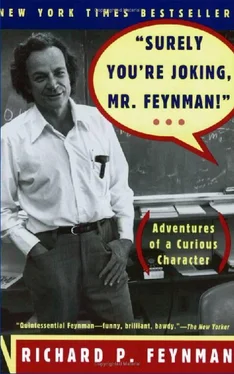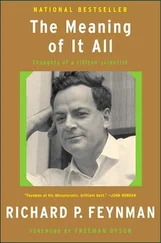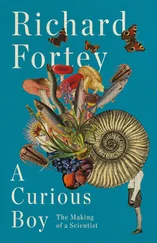Since then I never pay any attention to anything by “experts.” I calculate everything myself. When people said the quark theory was pretty good, I got two Ph. D.s, Finn Ravndal and Mark Kislinger, to go through the whole works with me, just so I could check that the thing was really giving results that fit fairly well, and that it was a significantly good theory. I’ll never make that mistake again, reading the experts’ opinions. Of course, you only live one life, and you make all your mistakes, and learn what not to do, and that’s the end of you.
One time a science teacher from the local city college came around and asked me if I’d give a talk there. He offered me fifty dollars, but I told him I wasn’t worried about the money. “That’s the city college, right?”
“Yes.”
I thought about how much paperwork I usually had to get involved with when I deal with the government, so I laughed and said, “I’ll be glad to give the talk. There’s only one condition on the whole thing”—I pulled a number out of a hat and continued—”that I don’t have to sign my name more than thirteen times, and that includes the check!”
The guy laughs too. “Thirteen times! No problem.”
So then it starts. First I have to sign something that says I’m loyal to the government, or else I can’t talk in the city college. And I have to sign it double, OK? Then I have to sign some kind of release to the city—I can’t remember what. Pretty soon the numbers are beginning to climb up.
I have to sign that I was suitably employed as a professor—to ensure, of course, since it’s a city thing, that no jerk at the other end was hiring his wife or a friend to come and not even give the lecture. There were all kinds of things to ensure, and the signatures kept mounting.
Well, the guy who started out laughing got pretty nervous, but we just made it. I signed exactly twelve times. There was one more left for the check, so I went ahead and gave the talk.
A few days later the guy came around to give me the check, and he was really sweating. He couldn’t give me the money unless I signed a form saying I really gave the talk.
I said, “If I sign the form, I can’t sign the check. But you were there. You heard the talk; why don’t you sign it?”
“Look,” he said, “Isn’t this whole thing rather silly?”
“No. It was an arrangement we made in the beginning. We didn’t think it was really going to get to thirteen, but we agreed on it, and I think we should stick to it to the end.”
He said, “I’ve been working very hard, calling all around. I’ve been trying everything, and they tell me it’s impossible. You simply can’t get your money unless you sign the form.”
“It’s OK,” I said. “I’ve only signed twelve times, and I gave the talk. I don’t need the money.”
“But I have to do this to you.”
“It’s all right. We made a deal; don’t worry.”
The next day he called me up. “They can’t not give you the money! They’ve already earmarked the money and they’ve got it set aside, so they have to give it to you!”
“OK, if they have to give me the money, let them give me the money.”
“But you have to sign the form.”
“I won’t sign the form!”
They were stuck. There was no miscellaneous pot which was for money that this man deserves but won’t sign for.
Finally, it got straightened out. It took a long time, and it was very complicated—but I used the thirteenth signature to cash my check.
I don’t know why, but I’m always very careless, when I go on a trip, about the address or telephone number or anything of the people who invited me. I figure I’ll be met, or somebody else will know where we’re going; it’ll get straightened out somehow.
One time, in 1957, I went to a gravity conference at the University of North Carolina. I was supposed to be an expert in a different field who looks at gravity.
I landed at the airport a day late for the conference (I couldn’t make it the first day), and I went out to where the taxis were. I said to the dispatcher, “I’d like to go to the University of North Carolina.”
“Which do you mean,” he said, “the State University of North Carolina at Raleigh, or the University of North Carolina at Chapel Hill?”
Needless to say, I hadn’t the slightest idea. “Where are they?” I asked, figuring that one must be near the other.
“One’s north of here, and the other is south of here, about the same distance.”
I had nothing with me that showed which one it was, and there was nobody else going to the conference a day late like I was.
That gave me an idea. “Listen,” I said to the dispatcher. “The main meeting began yesterday, so there were a whole lot of guys going to the meeting who must have come through here yesterday. Let me describe them to you: They would have their heads kind of in the air, and they would be talking to each other, not paying attention to where they were going, saying things to each other, like ‘G-mu-nu. G-mu-nu.’ ”
His face lit up. “Ah, yes,” he said. “You mean Chapel Hill!” He called the next taxi waiting in line. “Take this man to the university at Chapel Hill.”
“Thank you,” I said, and I went to the conference.
Once I was at a party playing bongos, and I got going pretty well. One of the guys was particularly inspired by the drumming. He went into the bathroom, took off his shirt, smeared shaving cream in funny designs all over his chest, and came out dancing wildly, with cherries hanging from his ears. Naturally, this crazy nut and I became good friends right away. His name is Jirayr Zorthian; he’s an artist.
We often had long discussions about art and science. I’d say things like, “Artists are lost: they don’t have any subject! They used to have the religious subjects, but they lost their religion and now they haven’t got anything. They don’t understand the technical world they live in; they don’t know anything about the beauty of the real world—the scientific world—so they don’t have anything in their hearts to paint.”
Jerry would reply that artists don’t need to have a physical subject; there are many emotions that can he expressed through art. Besides, art can be abstract. Furthermore, scientists destroy the beauty of nature when they pick it apart and turn it into mathematical equations.
One time I was over at Jerry’s for his birthday, and one of these dopey arguments lasted until 3:00 AM. The next morning I called him up: “Listen, Jerry,” I said, “the reason we have these arguments that never get anywhere is that you don’t know a damn thing about science, and I don’t know a damn thing about art. So, on alternate Sundays, I’ll give you a lesson in science, and you give me a lesson in art.”
“OK,” he said. “I’ll teach you how to draw.”
“That will be impossible, ” I said, because when I was in high school, the only thing I could draw was pyramids on deserts—consisting mainly of straight lines—and from time to time I would attempt a palm tree and put in a sun. I had absolutely no talent. I sat next to a guy who was equally adept. When he was permitted to draw anything, it consisted of two flat, elliptical blobs, like tires stacked on one another, with a stalk coming out of the top, culminating in a green triangle. It was supposed to be a tree. So I bet Jerry that he wouldn’t be able to teach me to draw.
“Of course you’ll have to work,” he said.
I promised to work, but still bet that he couldn’t teach me to draw. I wanted very much to learn to draw, for a reason that I kept to myself: I wanted to convey an emotion I have about the beauty of the world. It’s difficult to describe because it’s an emotion. It’s analogous to the feeling one has in religion that has to do with a god that controls everything in the whole universe: there’s a generality aspect that you feel when you think about how things that appear so different and behave so differently are all run “behind the scenes” by the same organization, the same physical laws. It’s an appreciation of the mathematical beauty of nature, of how she works inside; a realization that the phenomena we see result from the complexity of the inner workings between atoms; a feeling of how dramatic and wonderful it is. It’s a feeling of awe—of scientific awe—which I felt could be communicated through a drawing to someone who had also had this emotion. It could remind him, for a moment, of this feeling about the glories of the universe.
Читать дальше












